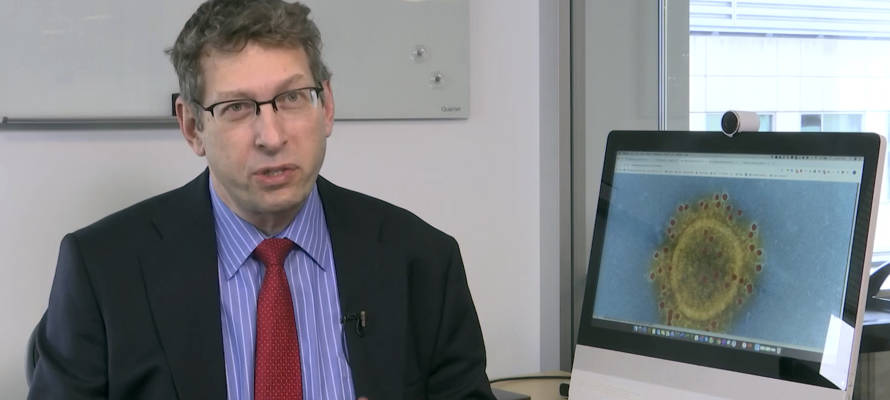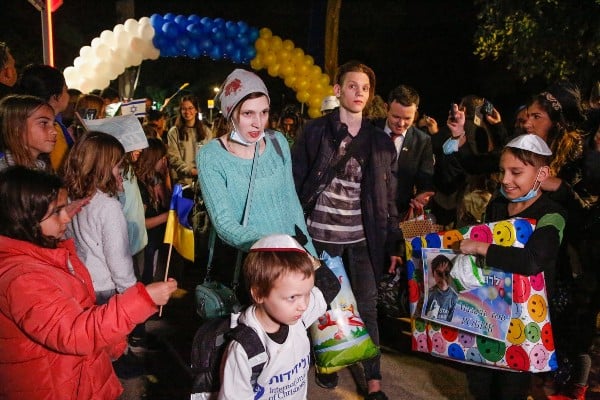“I can’t respond directly to things that have been said by Benjamin Netanyahu or Teva CEO Kare Schultz, but I can say there are talks taking place,” says Moderna’s chief medical officer.
By Sophie Shulman, CTech
Dr. Tal Zaks, the chief medical officer of Moderna, said in an exclusive interview with Calcalist, “I can’t respond directly to things that have been said by Benjamin Netanyahu or Teva CEO Kare Schultz, but I can say there are talks taking place since Moderna is obligated to increase our vaccine production capacity. We are currently working on manufacturing agreements with other companies both for producing the raw material for the vaccine and for its filling and packaging. We are updating our annual production targets and there may be further updates forthcoming.”
A week ago, Israeli Prime Minister Benjamin Netanyahu announced that both Pfizer and Moderna are examining the option of setting up vaccine manufacturing plants in Israel, with Zaks now indirectly confirming the prime minister’s claim, which also comes on the heels of Teva’s CEO saying earlier this month that his company was in negotiations with vaccine manufacturers to set up vaccine production lines in Teva factories.
Zaks further hints in the interview that Moderna prefers to set up production lines in existing sites rather than establish a brand new facility: “If there is a factory that is approved by the authorities and possesses good manufacturing practices, it lends itself to implementing the required processes and can begin large scale manufacturing in a faster and simpler way.”
Zaks added that the reason that Moderna produces the vaccines meant for the European market in a manufacturing plant that is owned by Switzerland-based drug company Lonza is because of the relative simplicity of adapting the factory to the vaccine production line, hinting that Teva could be an excellent candidate for production seeing how it possesses FDA-authorized drug-making facilities in Israel.
All this was said against the backdrop of Moderna’s announcement that it has increased its production capacity, primarily by expanding its manufacturing facilities, with an emphasis on locations outside of the U.S. The company announced that by the end of the year it will produce 700 million Covid-19 vaccine doses, despite having earlier estimated it could produce 600 million, adding that it could reach the ambitious one billion doses target if it manages to improve its production capabilities. Moderna also announced that it would be investing significant capital in new production sites, enabling it to manfacture 1.4 billion doses of the existing 100-milligram vaccines.
The company is also in the process of testing a reduced-volume (50-milligram) vaccine, which, if successful, could up its capacity to 2.8 billion doses a year. “The Company has already begun adding this capacity at its owned and partnered manufacturing facilities. Given a six- to nine-month timeframe to add capacity and an additional timeframe to permit regulatory validation and ramp-up, it is estimated that up to 12 months may be necessary before the additional production is available.” the company said in a statement Wednesday night.
Israel signed an agreement to purchase six million doses from Moderna, however, since it signed an extensive agreement with rival vaccine producer Pfizer, which includes clauses on data-sharing on the vaccine’s side effects, the vaccines Moderna delivered have remained in deep freeze. So far it has only supplied Israel with 100,000 doses, which are currently earmarked for distribution as single doses for people who have recovered from the disease, with a million more doses estimated to arrive in the coming months.
“We are in constant contact with the relevant Israeli government agencies and as far as we’re concerned, we are meeting all the quotas,” Zaks said.
Moderna has already provided 54.8 million doses to the U.S. government and is set to deliver 100 million more by the end of the first quarter. By the end of the first half of 2021, Moderna will provide the U.S. with 300 million doses, with Pfizer set to deliver the same amount.
“We are meeting the supply goals to the U.S. market and just last week delivered nine million doses, but the delivery rate in Europe is slower and lags behind America by a quarter, which is why we are examining other production opportunities around the world,” Zaks said.
So far, only 4 million Moderna doses have been manufactured in Europe. According to Zaks, one of the reasons is that there is a bottleneck when it comes to the factories where the vaccine is packaged, a process called ‘fill and finish.’ For that reason, Moderna is currently considering increasing the number of doses that go into a single bottle from 5-6 to 15. The bulk of the manufacturing is being carried out in a U.S. factory with which Moderna has an agreement and in Lonza’s factory in Switzerland, while the filling and packaging is being carried out in facilities owned by Spanish company ROVI, which last night reported a 30% boost in revenues due to its collaboration with Moderna, so for Teva it is certainly an attractive option.
Is the assumption behind the ambitious expansion plans that we will have to get vaccinated against Covid-19 annually, like with flu vaccines?
“We have to be prepared for the possibility that we will need to administer the vaccine once every year or two. We are committed to being prepared for any eventuality. We are already working on a booster dose that will be able to cope with the South African and Brazilian variants of the virus. I am not concerned with the British variant because it doesn’t harm the vaccine’s efficiency, compared to the other two, which seem to be more difficult to neutralize. That said, the vaccine is effective against all the strains and we are now beginning clinical trials for a booster shot to combat the South African variant.”
“Yes, but it doesn’t need to be tested on 30,000 subjects, only on several hundred.”
Were you disappointed that Israel was one of the first countries to sign a purchase agreement with you, but has relegated them to a plan B, after Pfizer?
“We sell the vaccines to the countries, what they do with what they purchase is in their hands. My mother who lives in Israel received the Pfizer vaccine and I’m glad that Israel got access to a substantial amount of Pfizer doses. We do what we can, but the bulk of our produce goes to the U.S. because the administration there was the one that supported our production from the start. I believe that going forward our booster will be suitable also for people who received vaccines created by any other company.
“There is already data from the U.S. that indicates that the side effects of our vaccine and of Pfizers are very similar, with nothing being disturbing or unpredictable. Our vaccine is just easier to distribute because of the storage requirements (unlike Pfizer’s vaccines which require deep freezing, Moderna’s only require ordinary refrigeration – SS).”
What about children? Have you started trials that will allow them to get vaccinated in the future?
“We are currently conducting trials on 12-18 year-olds and in the coming weeks we will complete recruiting subjects, with the data on teenagers arriving in the second half of the year. Research into younger children will commence in a month or two. For them, we have to try out different dosage amounts so we won’t have results before the end of the year.”
What about pregnant women? The recommendations are not clear-cut.
“We don’t have any data on pregnant women because it was not part of the trials, but in the U.S. some regions are vaccinating them, and others aren’t.”
What can you say to those who oppose vaccinations out of fear of long-term side effects?
“I don’t have an anti-nonsense card to play, but for every drug, you must weigh the benefits against the risk and whoever examines the disease closely realizes that it is better to avoid any theoretical risk. The history of vaccines shows that if there is anything problematic, it emerges within the first few weeks of them being administered. In the U.S. more than 50 million people have been administered our vaccine.”
On Thursday Moderna will release its financial reports for 2020, which was a turnaround year for the company. It is expected to report $320 million in revenues for the fourth quarter, up from only $14 million over the same period in 2019. According to Q1 2021 predictions, it will have reached $1.7 billion in revenue, all from sales of the Covid-19 vaccine.
“The vaccines gave us a substantial boost, but we have many more interesting things in the pipeline,” Zaks concludes. “Now that we have results showing that we’re safe and possess proven manufacturing capabilities, it only increases our ambition. You will see us deliver flu vaccines as well as drugs to combat autoimmune diseases.”
Bring Purim Joy to Israeli Victims of War and Terror
Join us in providing Israeli victims of war and terror with much needed comfort, blessing and holiday joy.
Families have been destroyed by the horrific Hamas massacre of October 7th and ongoing terror and rockets attacks. There are so many orphans that need our love, compassion and support!
Brighten their Purim holiday by sending Purim food baskets, yummy treats, personal notes and toys for the children.
CLICK HERE TO SEND YOUR PURIM GIFT & PERSONAL NOTE TO THE VICTIMS




